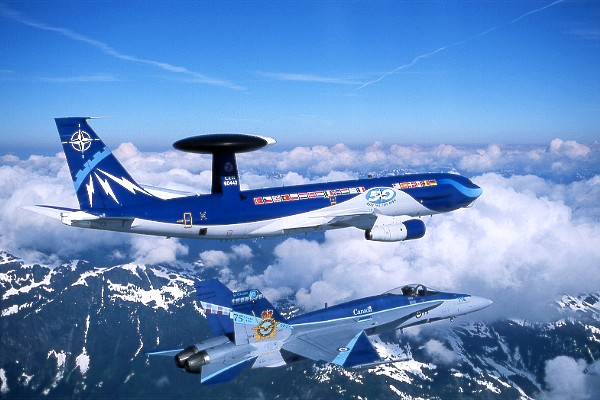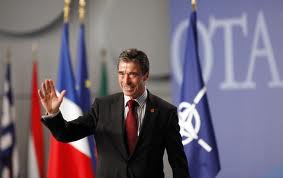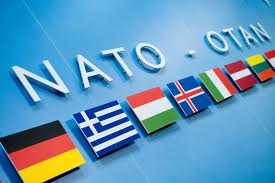 On September 30th, Mr. Rasmussen, NATO Secretary General, gave a talk underlining the themes that will be addressed in the Chicago Summit in May 2012. Mr. Rasmussen is facing a considerable challenge on top of the Afghan mission, namely the financial crisis. The crisis is lasting longer than initially thought and forcing members of the Euro-Atlantic Community to adjust their military standard of living with the reality of their economic situations. Rasmussen is simply calling what for the world of academia has been arguing for years, deeper integration in the field of security and defense at the Atlantic level.
On September 30th, Mr. Rasmussen, NATO Secretary General, gave a talk underlining the themes that will be addressed in the Chicago Summit in May 2012. Mr. Rasmussen is facing a considerable challenge on top of the Afghan mission, namely the financial crisis. The crisis is lasting longer than initially thought and forcing members of the Euro-Atlantic Community to adjust their military standard of living with the reality of their economic situations. Rasmussen is simply calling what for the world of academia has been arguing for years, deeper integration in the field of security and defense at the Atlantic level.
The Libyan mission started back in April 2011 has been considered by many as a victory for the transatlantic alliance and especially for President Sarkozy and Prime Minister Cameron. However, even in this climax of euphoria, the global financial crisis has been a considerable ‘intervening variable,’ a critical juncture affecting the defense budgets of the governments of the Euro-Atlantic community. Prime Minister Cameron was one of the first to initiate considerable defense cuts. Many European analysts have expressed their concerns over the absence of a strategic approach by the British leadership in its cuts. Back in July 2011, Mr. Leon Panetta, a former budget director in the Clinton White House, became the new U.S. Secretary of Defense. He was appointed by President Obama with the mission of leading the way to upcoming budgets cuts in the defense sector. Over $550 billion of cuts are expected to be made over the next decade. As argued by a report published by the Center for New American Security, the considerable defense cuts will “force the US military to reduce its force structure in ways that will impair its ability to protect vital American interests worldwide.” France will not be the exception to the rule, and will most likely be the next powerhouse of the Euro-Atlantic community as it adjust its defense spending in line with mounting debt.
As underlined by NATO’s Secretary General in his speech,
“Security is not an optional extra – even in times of austerity. It’s not a luxury – it’s a vital necessity. […] We may not be able to spend more, but we certainly can spend smarter by spending together – and that is what we must do. In the current economic climate, the need for cooperation is clearer than ever. The need for solidarity is stronger than ever. And the argument for transatlantic commitment is more compelling than ever.
[…] I want to see an Alliance where all Allies know they can rely on each other. Where all Allies are also able to make meaningful contributions to joint operations. And where all Allies demonstrate the political solidarity to develop, to deploy and to sustain those contributions.
That is why I encourage all Allies, especially in Europe, to focus investment in these vital capability areas. I am not naïve. I know that in an age of austerity, we cannot spend more. But neither should we spend less. So the answer is to spend better. And to get better value for money. To help nations to preserve capabilities and to deliver new ones. This means we must prioritize. We must specialize. And we must seek multinational solutions. Taken together, this is what I call Smart Defense.”
In his excellent article published in the Financial Times, James Blitz underlined three concerns around the concept of ‘smart defense.’ First, it will be difficult to get leaders to enhance defense collaboration. Leaders tend to limit the degree of shared defense equipment. Second, the problem of trust is too high. In the case of France and the UK, they have been defense partners for over a decade, since the creation of the ESDP. But the reaction of Germany and Poland in abstaining from joining the Libyan mission has been a wake up call for some governments. How can the sharing of defense goods be optimal when foreign policies and interests diverge? Another important concern is the problem of free-riding. Last but not least, leaders tend to protect national military-industrial complex. The autonomy of production is seen as a core dimension of national sovereignty and security.
 The concept of solidarity is already present in the Treaty of Washington, and is a core component of the European Union. However, in the sector of the defense ‘solidarity’ is a dirty word, as it implies military dependence on other states. It is especially difficult for governments with a history of independent active foreign policies based on national interests to rely on shared capabilities. But for France, Britain and the US, solidarity and shared-military equipment are more than words, they are are symbols of the end of an era: the decline of the West. Their foreign policies can no longer be back up by military actions as they used to be. In a shared military world, France would not have been able to launch a military operation in April in the Ivory Coast. Such lack of independence and reliance on other members could have considerable impact on the maintenance of individual spheres of influence, raising concerns among the political elites over pooling military resources.
The concept of solidarity is already present in the Treaty of Washington, and is a core component of the European Union. However, in the sector of the defense ‘solidarity’ is a dirty word, as it implies military dependence on other states. It is especially difficult for governments with a history of independent active foreign policies based on national interests to rely on shared capabilities. But for France, Britain and the US, solidarity and shared-military equipment are more than words, they are are symbols of the end of an era: the decline of the West. Their foreign policies can no longer be back up by military actions as they used to be. In a shared military world, France would not have been able to launch a military operation in April in the Ivory Coast. Such lack of independence and reliance on other members could have considerable impact on the maintenance of individual spheres of influence, raising concerns among the political elites over pooling military resources.
Ultimately, the concept of ‘smart defense’ is in fact a synonym of ‘integrated and shared defense,’ which is taboo in the defense sector. The political will of France, Britain and the US are the last bastion to a more integrated and atlantilateral approach to security and defense. NATO’s Secretary General has a little more than six months to push forward his new vision for the future of defense in the Euro-Atlantic community. It could be the worst time to push for such agenda as 2012 is a presidential election year in both France and the U.S.